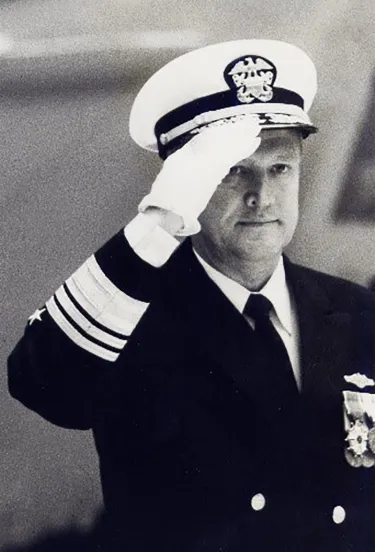Meet James S. from Severna Park, MD
A Color Bearer shares his inspiration
We cannot really understand the current issues in America without knowing their origin, and for many of them a study of the Civil War and its causes is required.
James Sagerholm, Color Bearer

A little boy, his brother and his father stood and saluted as a small group of old men in blue uniforms marched by, leading the annual Memorial Day parade in a small town in southwestern Pennsylvania. The year was 1935.
The boy was thrilled when the old men returned his salute, and although his father had told him about the war in which those old men had fought, he now felt a surge of fascination about that war that was called the Civil War, a fascination that continues to this day, a fascination that made him a life-long student of the war.
When he was sixteen, he made his first visit to a Civil War battlefield, on a cold, windy, overcast day in November. The battlefield of Gettysburg, with its numerous monuments and its imposing Round Tops, made an indelible impression on him, and stirred his imagination as he stood at the copse of trees on Cemetery Ridge, seeing in his mind’s eye the grand spectacle of Pickett’s Charge and the terrible casualties that ensued. It gave him an understanding of the battle that simply could not be realized in any other way, and with that understanding came an appreciation of the heroic bravery and sacrifices of the men on both sides of that conflict.
We cannot really understand the current issues in America without knowing their origin, and for many of them a study of the Civil War and its causes is required. There has been recently a tendency among historians to concentrate on the social aspects of the Civil War while neglecting the military, impelled party by the desire to gain recognition by addressing something “fresh and different,” and partly by the belief that recounting the history of battles and acts of valor tends to glorify war. There is no denying that the spectacle of battle arouses a primitive excitement that led Lee to remark at Fredericksburg that it was well that war was so terrible lest we become too fond of it. But war means battles, and the study of war cannot be done adequately without including the battles and the acts of men therein, and battles cannot be adequately comprehended without studying the grounds where the battles took place. Thus, the need for the preservation of battlefields becomes obvious.
An additional important reason for preserving battlefields is their value in awakening an interest in, and appreciation of, the history of our nation. Visiting the sites where men struggled and died in defense of the ideals that have been the hallmark of America, and have made our beloved nation the bright beacon of freedom in this world, can effectively counter the growing lack of education in our schools about the true history of America, as reported in recent studies. Absent this knowledge, the leaders of tomorrow will be handicapped in keeping America on the right course.
The work of the American Battlefield Trust has never been more important.




